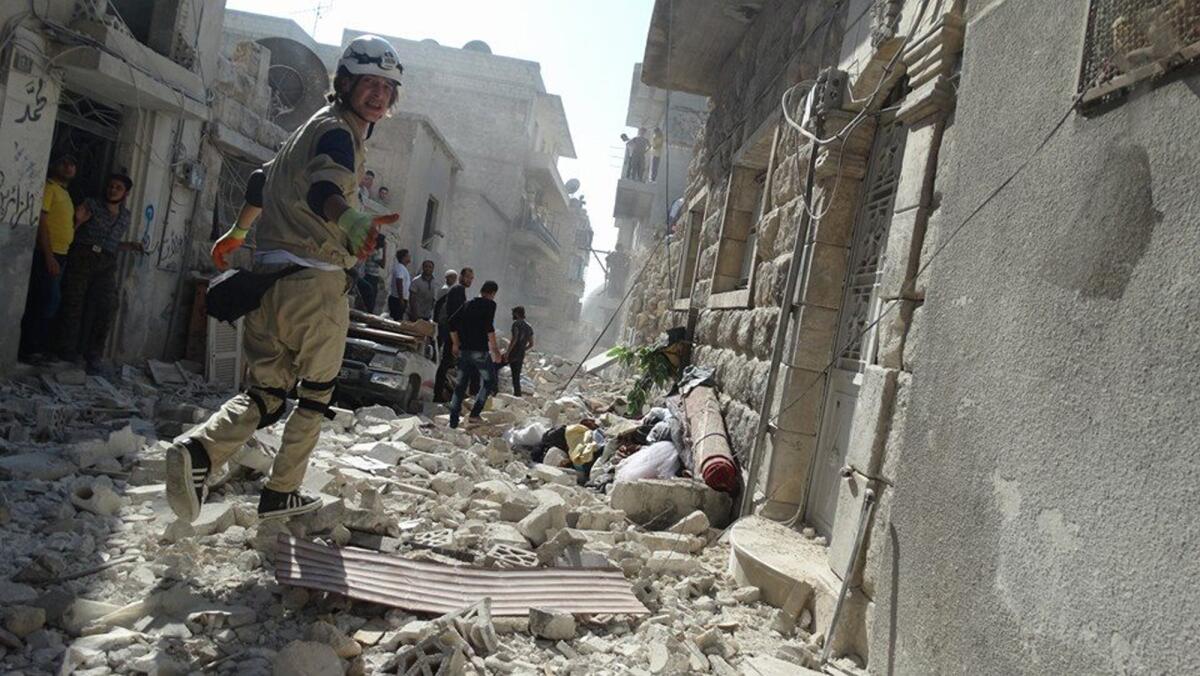U.S. downplays gains by Al Qaeda affiliate in Syria

- Share via
Reporting from AMMAN, Jordan — Al Qaeda-linked fighters have overrun key northern bastions of U.S.-backed Syrian rebels and were menacing a major border crossing, dealing a heavy blow to American hopes that moderate Syrian factions would provide significant aid in the battle against the militants of the Islamic State.
U.S. officials downplayed the setback as temporary.
Meanwhile, in Iraq, Islamic State fighters executed several dozen more members of a tribe that has defied them, according to tribal leaders. Islamic State fighters were also reported to have seized another Syrian energy installation, the Jahar gas field in Homs province.
The onslaught by the Nusra Front in the northern province of Idlib routed the U.S.-equipped fighters, the group boasted in a statement Sunday that was largely corroborated by activists in the area Monday.
The Nusra fighters were also massing near the Bab al-Hawa crossing into Turkey, activists said, menacing an important supply line for the Western-backed fighters.
Internecine fighting among rebel factions had been going on for months in Idlib, but over the weekend the Nusra Front seized major positions of the U.S.-supported Syrian Revolutionaries Front, and members of another Western-backed faction, Haraket Hazm, then fled or surrendered, activists reported.
Dozens defected to the Nusra Front, according to the pro-opposition Syrian Observatory for Human Rights, a Britain-based watchdog group. An undetermined amount of U.S.-provided weaponry also fell into the attackers’ hands, with Nusra Front supporters taking to social media to gloat.
Working with moderate Syrian rebels is a linchpin of the Western strategy against the Islamic State, with the U.S. and its allies staging airstrikes but not providing ground troops, so the rout of Western-backed factions represents a serious setback to those plans.
White House officials appeared chagrined by reports of the FSA failures, and said they were still assessing the setbacks on Monday afternoon. One senior official said he wasn’t ready to call it a total collapse yet.
The multifront nature of the fight is “taking a toll” on the fighters, said White House Press Secretary Josh Earnest. However, he said the U.S. government never thought the effort to equip the moderate Syrian fighters was something that could be achieved overnight.
Pentagon spokesman Col. Steve Warren played down the significance of the reports.
“There are battles all the time between these various groups and territory trades hands in these local areas regularly,” Warren said at a press briefing. “Often these battles and trading of territory are talked about in exaggerated terms for various reasons, but right now we haven’t seen any indications of something big or catastrophic.”
According to the Syrian Observatory for Human Rights, dozens of Western-backed Syrian rebels defected to the Nusra Front.
While the Nusra Front is not considered to be as extremist as Islamic State militants, it has been designated a terrorist group and targeted by U.S.-led airstrikes.
Idlib province in northwestern Syria has already suffered three years of civil war between antigovernment rebels and President Bashar Assad’s security forces. Unlike Islamic State, Nusra enjoys wide support among Syrian rebels and civilians living in areas it controls.
The Syrian Revolutionaries Front and Haraket Hazm had been the first to receive heavy weaponry from the United States, such as TOW antitank missiles.
Israfil Yilmaz, the nom de guerre of a fighter claiming to be in Idlib, said on Twitter that tanks, antitank missiles and “much more equipment” had been seized from the Syrian Revolutionaries Front as the Nusra fighters advanced.
The Islamic State juggernaut has been concentrated in northern and eastern Syria, and large swaths of western Iraq. In Iraq’s Anbar province, Islamic State extremists have been reported by tribal figures to have executed several hundred members of the Albu Nimr, a tribe that had tried to hold them off.
The killings of 36 more tribespeople were reported on Monday by tribal head Naim al-Kaood, who spoke to local Iraqi news outlets.
The Islamic State has also been besieging the northern Syrian town of Kobani for more than six weeks. Defenders, bolstered by a contingent of Iraqi Kurdish soldiers who arrived last week, have managed to hold them off, with the help of American airstrikes. But the Islamic State has bragged in propaganda videos that the town is about to fall.
The Islamic State, which has declared a “caliphate” in the territory it holds, enforces its rule with a reign of terror that has included beheadings, crucifixions and sexual slavery.
Rival groups have accused the Nusra Front of trying to carve out a “caliphate” of its own, at the expense of the fight to topple Assad.
Jamal Maarouf, the Syrian Revolutionaries Front’s top commander, railed against the group in a video posted on YouTube. “We are defending Syria ... you who have distorted Islam, you who have distorted religion, why do you fight us?” he shouts.
The Nusra Front said it was willing to observe a cease-fire, but demanded that Maarouf appear before an Islamic court.
Special correspondent Bulos reported from Amman and staff writer King from Cairo. Times staff writers Christi Parsons and W.J. Hennigan in Washington contributed to this report.
Twitter: @laurakingLAT
More to Read
Sign up for Essential California
The most important California stories and recommendations in your inbox every morning.
You may occasionally receive promotional content from the Los Angeles Times.













